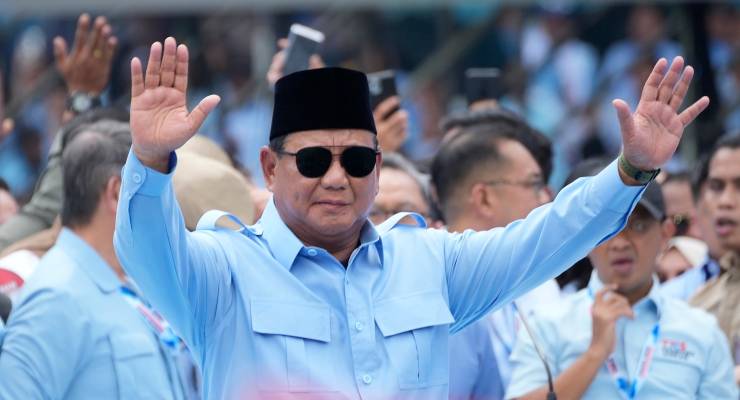
Indonesia doesn’t do a democracy sausage; they do a party. The pesta demokrasi is in full swing as 205 million registered voters get ready to have their say on 575 House members and one president-vice president ticket on Wednesday morning.
Foreign policy has barely featured in the months-long campaign, but which way Indonesia votes always has the potential to cause ripples across the region. With three candidate pairs and the first plausible run-off scenario in Indonesia’s history, drama is at an all-time high.
President Joko Widodo, better known as Jokowi, swept into power in 2014 off the back of an electrifying campaign promising a new Indonesia. The Jokowi era would look ahead, moving on from the Reformasi period that rebuilt Indonesia after the fall of Suharto but largely codified the political elite in Jakarta. Here was a former businessman from the relatively sleepy streets of Solo, Central Java, ready to wrestle power from the capital.
Jokowi spent his first five-year term focusing on infrastructure development and social programs, as well as shaking off the criticisms that he was merely a puppet for former president Megawati Sukarnoputri and her Partai Demokrasi Indonesia Perjuangan (PDI-P). It worked and he performed even better in the 2019 election.
For some, the legacy he’s most likely to leave as his term finishes this October is returning Indonesia into the hands of Jakarta’s elite.
It’s Jokowi’s two-time challenger who looks set to become his successor. Prabowo Subianto — a former army general who has dodged human rights abuses allegations, which he denies, dating back to the East Timor conflict and the 1998 upheaval that tore down Suharto (his former father-in-law) — joined Jokowi’s cabinet as defence minister shortly after losing the 2019 election, but not before supporters rioted in Jakarta over his loss, leaving eight dead.
The Prabowo of 2024 is a distinctly different man. Gone is the chest-thumping strongman of the past — for now, at least. This race is all about gemoy, a slang term meaning irresistibly cute. No longer dressed in the semi-militia drapes of his previous campaigns, Prabowo has leaned into his age and his “grandfather” image by wearing powder blue, and is depicted in campaign posters as an AI-generated cartoon better suited for the next Pixar hit than addressing the G20.
Still, Prabowo’s running-mate has proved more controversial than the ex-general himself. Gibran Rakabuming Raka, the 36-year-old mayor of Solo and the eldest son of President Widodo, is running second fiddle to Prabowo after a highly controversial Constitutional Court ruling declared Gibran eligible despite a minimum age of 40 for candidates. That his uncle, Anwar Usman, was a chief justice (since sidelined on ethics issues) and allegedly lobbied hard for the decision has left a sour taste for many who saw the Widodo clan as a salve to the insular politics of Jakarta.
Polling released late last week has the Prabowo-Gibran ticket squeaking across the 50% threshold in the first round after a surge in support. But sceptics say polling can be skewed by who is commissioning it, and supporters of other tickets remain confident that it’s still anyone’s game.
Anies Baswedan, a former Jakarta governor and minister under Jokowi, has stunned watchers after going from a distant third to the most likely to face off against Prabowo in a potential run-off. Anies was briefly internationally notorious in 2017 after winning a deeply divisive and racialised gubernatorial race in the capital.
Anies is supported by most of Indonesia’s Islamic parties, which sit along a spectrum of ideologies but very much within the moderate Islam the country is known for. By selecting Muhaimin Iskandar, a hyper-connected figure in the Muslim wing of Indonesian politics, Anies has effectively neutralised previous concerns that he would, again, court the less orthodox, more radical elements of the community including newer groups that were established during the 2017 race.
Former governor of Central Java Ganjar Pranowo and his running-mate, the eminently qualified former minister and Constitutional Court chief justice Mahfud MD, trail. Once expected to be a frontrunner with the blessing of PDI-P party boss Megawati and long-time friend Jokowi, Ganjar has struggled to make a game-changing impact and is likely looking at a run-off that leaves him out — although with the potential to team up with Anies and maybe find himself in a nice cabinet job until 2029.
How it shakes out on Wednesday — or in June if it heads to a run-off — may be less consequential in the long run when compared to the seismic shift that has already quietly taken place. This election is the first time millennial and Gen Z voters have become the majority. For a country so rightly proud of its fight for and grappling with democracy since 1998, it is now looking at being dominated by generations with very little or no firsthand experience of those struggles.
What these young people want Indonesia to look like is strikingly different to their parents and grandparents, polling has shown. Prabowo’s candidacy has split along generational lines — and how that plays out when votes are tallied could be a sign of the direction Indonesia will head in for decades to come.








It’s a concern that the younger demographic of first time voters may be unaware of the likely human rights abuses and strongman past of Prabowo.
Shouldn’t the opposition be highlighting it?
Not if they don’t want to the army to stage a coup. From the Intercept
“n 2016, Jokowi’s government organized an event called the Symposium, where survivors of the U.S.-backed 1965 slaughter were given the chance to talk about it publicly. This event so enraged the army that Jokowi had to go to the military’s headquarters and prostrate himself, but the president’s groveling failed to calm the army.
It was after that Prabowo’s generals and the ISIS-linked groups staged the quasi-religious mass demonstrations with the covert aim of bringing Jokowi down.”
I sense the cynicism: Historically, the candidates have strong links to one another, either through party affiliations, the military and/or the old New Order. This, I would imagine, conveniently cancels out any serious attempt by any one candidate to hold another candidate accountable.
Their special forces are trained by our special forces, so it’s hard to imagine any human rights abuses in our closest neighbour.